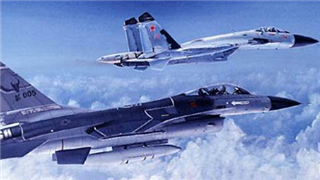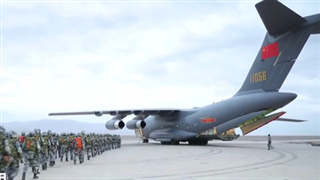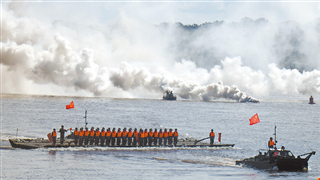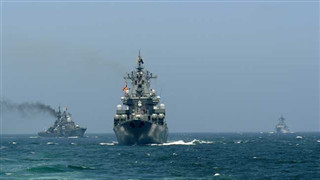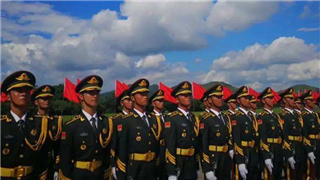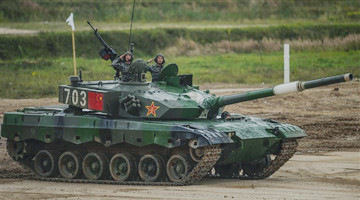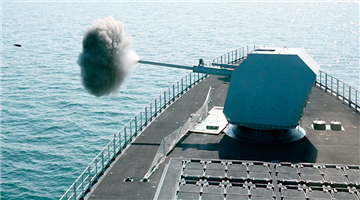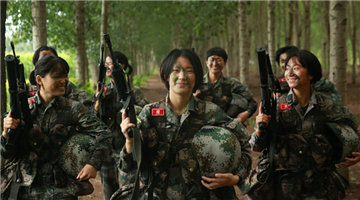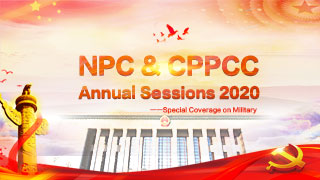By Wei Xinan and Xu Sanfei
This year marks the 75th anniversary of the victory of the Chinese People's War of Resistance against Japanese Aggression and the World Anti-Fascist War. The Chinese People's War of Resistance against Japanese Aggression is an important part of the World Anti-Fascist War and a struggle to save the nation from peril under a severe and complex situation. Based on scientific analysis of the characteristics of the basic contradictions between China and Japan, Chinese Communists with Mao Zedong as their chief representative, advocated the establishment and maintenance of two united fronts both at home and abroad, and the implementation of the national war of resistance and the general military strategy of a protracted anti-Japanese war, pointing out the right direction for winning the war.
Two cognitions: blindly one-sided and comprehensively objective
Following the outbreak of the nationwide war of resistance against Japanese aggression, the Japanese aggressors claimed to destroy China in three months. What is the future of the anti-Japanese war in the face of the arrogant clamor? Where is the Chinese nation going? All these became the focuses of the nation at that time. The theory of national subjugation believed that China's weapons were inferior to those of Japan, thus China was surely to be defeated in the first battles of the war, and would inevitably be conquered if insisting in refighting with Japanese troops. Whereas the theory of quick victory believed that the war would only last three months and international situation would definitely change then, when the Soviet Union would send troops for sure to end the war.
Mao Zedong analyzed and pointed out in his On Protracted War that Japan was a powerful imperialist country, and China was a semi-colonial and semi-feudal country, compared with Japan, China was far behind in its military, economic, and political strength. Therefore, a war between the two countries was inevitable and China could not expect a quick victory. However, given its relatively small territory and lack of manpower, military, financial and material resources, it was impossible for Japan to withstand long-term wars; while China could withstand protracted wars with a vast territory, abundant resources and a large population. These basic characteristics fundamentally determined that the War of Resistance against Japanese Aggression had to be arduous and long-lasting, but the prospects for the war were bright and great.
The great victory of the Chinese People’s War of Resistance against Japanese Aggression shows that viewpoints of objectivity, comprehensiveness, and dialectics are of great significance to studying wars and understanding the characteristics and laws of wars, which are an important basis for correctly guiding and conducting wars, and also a critical prerequisite for defeating a powerful opponent by a weak force.
Two choices: rigid response and subjective initiative
The material conditions only provide the possibility of victory or defeat in war. To turn the possibility into reality, you must rely on human subjective efforts. After the outbreak of the nationwide war of resistance against Japanese aggression, the Kuomintang (KMT) Army was responsible for confronting the Japanese invading troops on the center stage battlefield. However, due to the implementation of the "protracted attrition" strategy, the KMT Army adopted a passive and purely defensive policy in campaign guidance, mainly conducting linear positional defensive warfare. In addition, due to other restricting factors including its insufficient preparations for war, it thus constantly lost cities and towns.
The Communist Party of China (CPC) insisted on mobilizing the people and relying on the people. While proposing the general strategic policy of a protracted war, it also formulated the military strategic policy of "dominated by guerrilla warfare, followed by mobile warfare under favorable conditions". Accordingly, the anti-Japanese armed forces led by the CPC including the Eighth Route Army and the New Fourth Army mobilized the masses deep in the enemy's rear, launched flexible guerrilla warfare, and contained and attacked a large number of enemies, opening up and expanding a vast backstage battlefield, where guerrilla warfare behind enemy lines coordinated the regular battles on the center stage battlefield.
Two battlefields: the center stage battlefield and the backstage battlefield
The joint fight against the enemy both on the center stage battlefield and the backstage battlefield is a product achieved by the cooperation between the KMT and the CPC , and also the most important achievement of the Chinese united front against Japanese aggression.
The CPC actively advocated and promoted the establishment of the broadest Chinese united front against Japanese aggression based on the cooperation between the KMT and the CPC, forming a strategic situation in which the KMT-led center stage battlefield and the CPC-led backstage battlefield were different but interdependent and jointly resisted the enemy.
Mao Zedong pointed out that in front of the common enemy of the nation, the Chinese troops forgot old grievances, made close comrades-in-arms and assisted each other, which was the fundamental reason why China would never be to perish. The center stage battlefield was the main battlefield during the strategic defense phase. After entering the stalemate phase, the center stage battlefield’s position was gradually replaced by the backstage battlefield. The two battlefields formed a favorable strategic posture of double-sided attack against the enemy and played a decisive role in changing the balance of combat power between China and Japan, enabling China to survive the most difficult and important stalemate stage.
Two forces: material basis and spiritual support
War is not only a contest of material power between the two parties involved, but also a contest of spiritual power between the two sides.
The CPC and the armed forces under its leadership carried out a comprehensive and in-depth general mobilization for the anti-Japanese war with their own exemplary actions, which stimulated the sense of mission and awareness of crisis of the whole nation. In the history of the Chinese nation’s resistance to foreign aggression in modern times, there has never been a war of resistance like the Chinese People’s War of Resistance against Japanese Aggression, where the people were so proactive, the degree of mobilization was so extensive, and the people’s will to fight was so tenacious. Whether it was on the center stage battlefield or the backstage battlefield, valiant Chinese soldiers fought bloody battles and killed the enemies dauntlessly. People from all walks of life were united and shared a bitter hatred of the enemy. The Chinese nation fully rejuvenated and showed the patriotic feelings of everyone being responsible for his country’s rise or fall, the national integrity of rather dying than surrendering, the heroic spirit of defying brutal force and fighting to the last drop of blood, as well as the indomitable and persevering belief in victory.
The great victory of the Chinese People’s War of Resistance against Japanese Aggression shows that although advanced weapons and equipment are the important material and technological basis for winning, the tenacious fighting will and unyielding fighting spirit are indispensible and at the core of winning in any form of war.
Two approaches: self-reliance and extensive alliance
The victory of war is a result of the convergence of various forces. Only by uniting all the forces that can be united and creating a favorable external environment can we achieve the most favorable outcome.
On the eve of Japan's full-scale war of aggression against China, Mao Zedong proposed: we advocate the establishment of a Pacific United Front with a combination of China, Great Britain, the United States, France and the Soviet Union; otherwise, each of us might be defeated. After the outbreak of the nationwide war of resistance against Japanese aggression, especially after the Attack on Pearl Harbor, the CPC considered China's anti-Japanese aggression war in the framework of the world's anti-Fascist war, proactively calling for the establishment of a united front of all nations against Japanese aggression in the Pacific, and persisting in fighting the war of anti-Japanese aggression till achieving complete victory. The US, the UK, the Soviet Union and other major powers gradually realized that China was the world’s outpost against Japanese fascist aggression. The US, the UK conducted joint operations on the Burma battlefield with China. The US military stationed an observation team in Yan'an to coordinate joint operations with the armed forces led by the CPC. The Soviet Union and the US successively provided military assistance to China. Apart from providing loans and material assistance, the two countries sent military personnel to China to participate in fights against Japanese aggressors.
The great victory of the Chinese People’s War of Resistance against Japanese Aggression shows that it is a must to establish the most extensive international united front to defeat the evil forces and achieve peace and development. This united front should and can transcend the boundaries of ideology and social system, following the principle of equal consultation, candid cooperation, and mutual support to achieve common development and progress.
Two endings: justice is sure to defeat aggression
Since modern times, Japanese militarism has accumulated capital through frantically plundering abroad, embarking on the path of aggression and expansion. The war of aggression by Japan has brought serious disasters to the Chinese people, caused significant damages to China in various areas including military, economy, and culture, and severely hindered the development of Chinese society. Japan's aggression against Asian countries has also caused serious damage to world peace and human civilization.
The victory of the Chinese People’s War of Resistance against Japanese Aggression is the victory of human justice and conscience. Of course, the arduous course of the war also shows that in the face of the law of the jungle where the weak are the prey of the strong, the justice without strength is weak, and only with strength can we truly control our own destiny.
The great victory of the Chinese People’s War of Resistance against Japanese Aggression shows that the historical trend of justice over evil is unstoppable. The law of the jungle is not the way for mankind to survive. Wantonly engaging in military aggression is not the strategy for human development. Building a community with a shared future for mankind, characterized by mutual respect, equal coexistence, peaceful development, and common prosperity, is the right way in the world.
